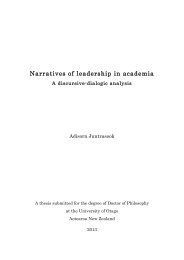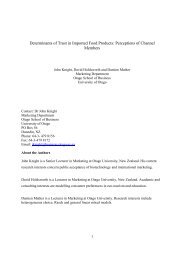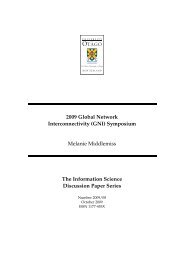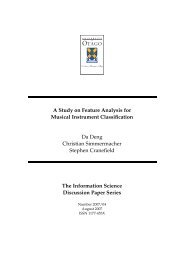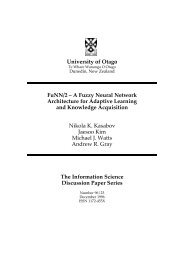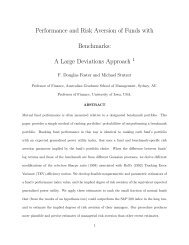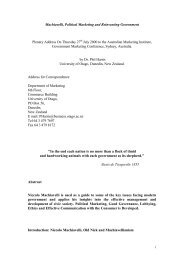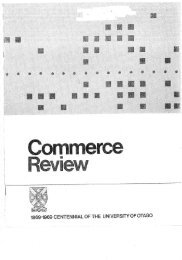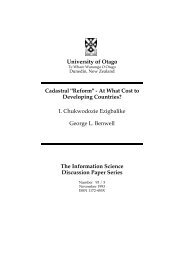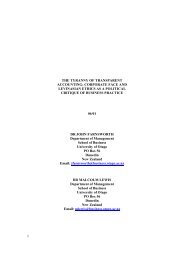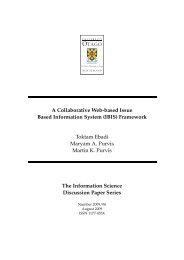Where is R2P grounded in international law? Anne-Marie Judson A ...
Where is R2P grounded in international law? Anne-Marie Judson A ...
Where is R2P grounded in international law? Anne-Marie Judson A ...
You also want an ePaper? Increase the reach of your titles
YUMPU automatically turns print PDFs into web optimized ePapers that Google loves.
CHAPTER 3 – THE RULE OF LAW<br />
Th<strong>is</strong> chapter covers the rule of <strong>law</strong> <strong>in</strong> relation to the concept of <strong>R2P</strong> and <strong>in</strong>ternational<br />
<strong>law</strong>. The question of the rule of <strong>law</strong> <strong>is</strong> important because it <strong>is</strong> the framework for<br />
violations or breaches of contract <strong>in</strong> treaties. Th<strong>is</strong> applies to the question on<br />
ground<strong>in</strong>g <strong>in</strong> <strong>in</strong>ternational <strong>law</strong> because it def<strong>in</strong>es the areas of obligations and the<br />
responsibilities of states. There <strong>is</strong> no universal concept of the rule of <strong>law</strong> but it <strong>is</strong><br />
<strong>in</strong>stead referred to as a family of related concepts. 143<br />
For example the Secretary-General Ban Ki-Moon describes the rule of <strong>law</strong>.<br />
“It refers to a pr<strong>in</strong>ciple of governance <strong>in</strong> which all persons, <strong>in</strong>stitutions and<br />
entities, public and private, <strong>in</strong>clud<strong>in</strong>g the head of state itself, are accountable<br />
to <strong>law</strong>s that are publically promulgated, equally enforced and <strong>in</strong>dependently<br />
adjudicated, and which are cons<strong>is</strong>tent with <strong>in</strong>ternational human rights norms<br />
and standards. It requires as well measures, to ensure adherence to the<br />
pr<strong>in</strong>ciple of supremacy of <strong>law</strong>, equality before the <strong>law</strong>, accountability to the<br />
<strong>law</strong>, fairness <strong>in</strong> the application of <strong>law</strong>, separation of powers, participation <strong>in</strong><br />
dec<strong>is</strong>ion-mak<strong>in</strong>g, legal certa<strong>in</strong>ty, avoidance of arbitrar<strong>in</strong>ess and procedural<br />
and legal transparency”. 144<br />
The Charter of the United Nations could be considered the ultimate rule of <strong>law</strong> for<br />
states on <strong>in</strong>ternational peace and security. The Charter not only <strong>is</strong> b<strong>in</strong>d<strong>in</strong>g <strong>in</strong> regards<br />
to <strong>in</strong>ternational peace and security but it can also back these up with Security Council<br />
dec<strong>is</strong>ions to enforce the duties <strong>in</strong> place. At the same time the International Court of<br />
Justice Statute <strong>is</strong> as enforceable as the Charter itself because it was conjo<strong>in</strong>tly signed<br />
by all members of the United Nations, It presents an ipso facto agreement of state’s<br />
b<strong>in</strong>d<strong>in</strong>g to <strong>in</strong>ternational <strong>law</strong> <strong>in</strong> relation to violations and breaches between states<br />
before the court. Each state that becomes a party to the Charter of the United Nations<br />
also ipso facto becomes a party to the ICJ statute. The states acknowledge its b<strong>in</strong>d<strong>in</strong>g<br />
143 Lev<strong>in</strong>e, D. (2010). Rule of Law, Power d<strong>is</strong>tribution and the problem of faction <strong>in</strong> Conflict <br />
Interventions. In M. Sellers, & T. Tomazewski, The Rule of Law <strong>in</strong> Comparative Perspective, Jus <br />
gentium: Comparative perspectives on Law and Justice (p. 147). Found on Spr<strong>in</strong>ger Science+ <br />
Bus<strong>in</strong>ess Media B.V. 2010 DOI 10.1007/978-‐90-‐481-‐3749-‐7_9 last accessed 22 nd September <br />
2011 <br />
144 Ki Moon, B. (2004). Report of the Secretary-General on the Rule of Law and Transitional Justice <br />
<strong>in</strong> Conflict and Post Conflict Societies. United Nations. (S/2004/616) para 6 <br />
<br />
57



